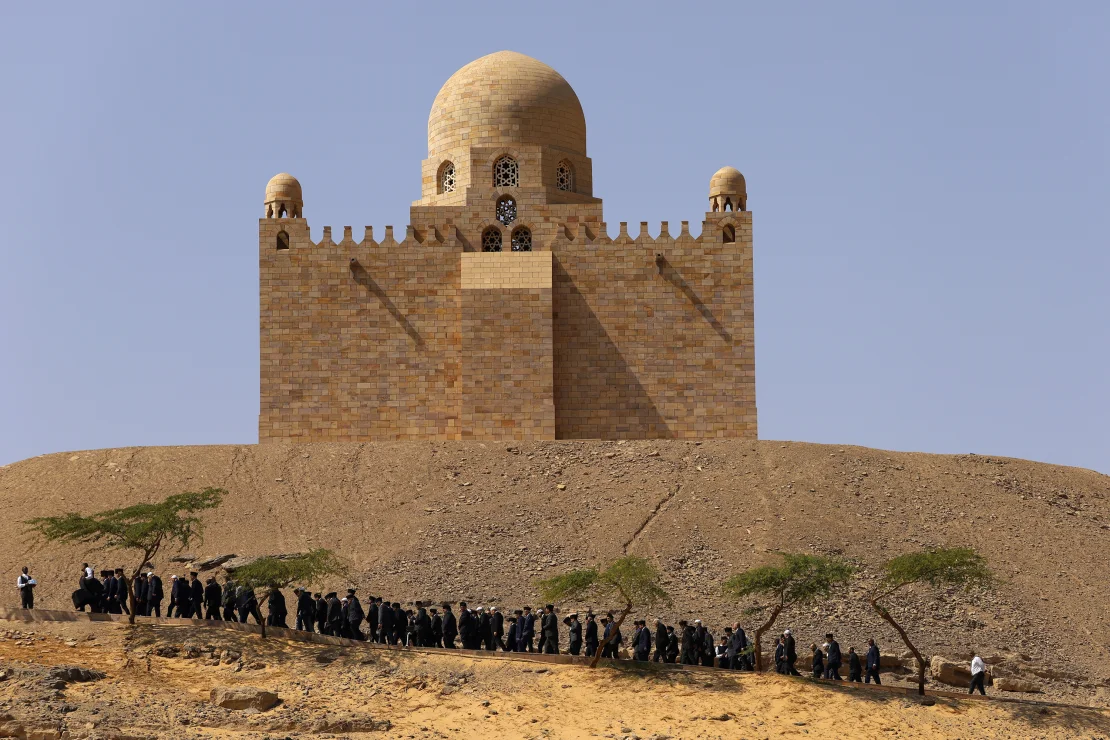

Prince Karim Aga Khan IV, the 49th hereditary Imam of the Ismaili Muslims, who died February 4 at the age of 88, in Lisbon, Portugal was laid to rest Sunday in Aswan, Egypt.
The region is also the final resting place of his grandfather, Sir Sultan Mahomed Shah Aga Khan III, and his wife, Mata Salamat.
According to Aswan Governor Ismail Kamal who spoke when he received the family ahead of the ceremony, it was Karim's wish to be buried in Aswan.
“When his will was opened, it was found that he had requested to be buried in Aswan near his grandfather, Sultan Muhammad Shah, and his grandmother, Om Habiba,” said Kamal.
The Aga Khan is considered by his followers to be a direct descendant of the Prophet Muhammad and is treated as a head of state.
Prince Karim was born in Geneva, Switzerland, to Prince Aly Khan and Joan Yarde-Buller.
His early years were spent in Kenya before he moved to Switzerland for his studies.
He was given the title of “His Highness” by Queen Elizabeth in July 1957, two weeks after his grandfather, the Aga Khan III.
This was after his father unexpectedly made him heir to the family’s 1,300-year dynasty as leader of the Ismaili Muslim community.
Why Egypt?
Prince Karim is said to have requested to be buried in Egypt, near his grandfather, the 48th Imam of the Ismaili Muslims, and his grandmother.
They both enjoyed warm relations with the people of Aswan, which have been sustained by the late Prince Karim and his family, through the work of the Om Habibeh Foundation and the Aga Khan Foundation.
His decision is believed to be a special honour to his family’s deep connection to Egypt, a land that has played a crucial role in shaping his family's spiritual and cultural identity.
It is also worth noting that at the age of 20, he inherited the title of Aga Khan following the passing of his grandfather.
Aga Khan III is said to have bypassed his father, Prince Aly Khan, and his uncle, Prince Sadruddin Aga Khan, who was in direct line to succession to name him Aga Khan IV to succeed him.
Aswan also holds a historical significance for the Aga Khan family as it pays homage to the Fatimid dynasty, from which the Ismaili Imams trace their lineage.
Fatimid was an Arab dynasty that ruled the Fatimid Caliphate, between 909 and 1171 CE.
Descended from Fatima and Ali, and adhering to Isma'ili Shi'ism, they held the Isma'ili imamat and were regarded as the rightful leaders of the Muslim community.
With the burial of Aga Khan IV in Aswan, Egypt now holds the mausoleums of two Ismaili spiritual leaders.
The burial site is located in the southern province of Aswan.
The Aga Khan III mausoleum sits atop a hill along the west bank of the Nile just 2.5 miles from the Aswan Train Station.
It overlooks the Prince Sadruddin Aga Khan House, a winter home of the Aga Khan.
The villa Nour El Salam was designed by Egyptian architect Hassan Fathy and it served as a winter home for Aga Khan III, whose will stated that he would be buried near the villa two years after his death Its construction began in 1956 and ended in 1960.
His wife Begum commissioned its construction, which initially accepted tourists inside- however, the interior was closed off to the public in 1997.
A red rose is laid on the Aga Khan III's tomb every day – a practice first started by Begum. Aga Khan III, who suffered from rheumatism and bone pain, first visited Aswan in 1954 in search of relief from his ailments.
After experiencing a miraculous recovery due to the region’s therapeutic sands, he chose to make Aswan his winter home. Sultan Muhammad Shah passed away in 1957 and his presence near the sacred Nile River has long been revered.
Aga Khan IV was succeeded by his son Prince Rahim al-Hussaini Aga Khan V.
He assumed office Tuesday.
The accession ceremony, held at the Diwan of the Ismaili Imamat in Lisbon, Portugal, witnessed the attendance of several global leaders of the community.
The ceremony was marked by religious recitations, the presentation and donning of insignia of office, and the pledging of spiritual allegiance by leaders of the Ismaili community on behalf of all Ismailis around the world.
Prince Rahim will be the 50th hereditary Imam of the Ismaili Muslims, who say they are direct descendants of the Prophet Muhammad.



![[PHOTOS] Ruto at Pope Francis' burial](/_next/image?url=https%3A%2F%2Fcdn.radioafrica.digital%2Fimage%2F2025%2F04%2F844cb891-abd4-4ee5-bc2d-2a0c21fa3983.jpeg&w=3840&q=100)






